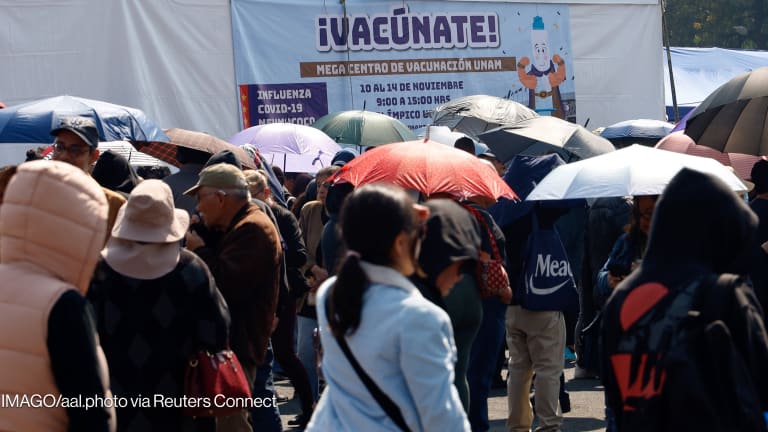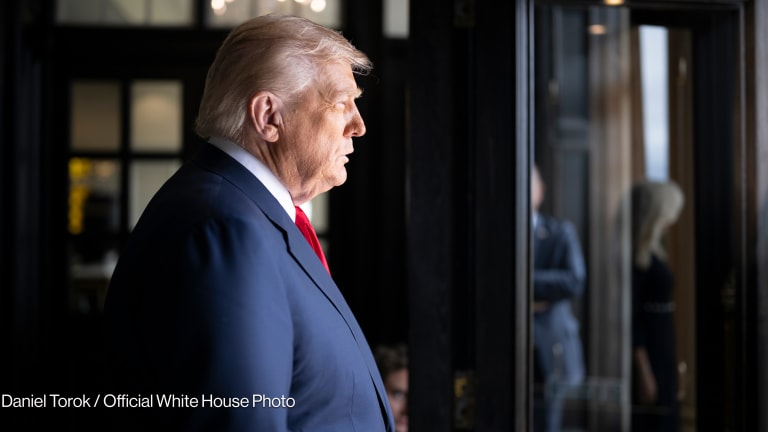More info on possible rescission expected next week, USAID chief of staff says

WASHINGTON — U.S. Agency for International Development Chief of Staff Bill Steiger said Wednesday that he expects “some conclusions” by next week on the White House’s possible attempts to rescind U.S. foreign assistance funds.
Steiger, who does not often speak on the record at public events, was asked about the possible rescission during at event discussing innovation and USAID’s journey to self-reliance. He said that OMB last week asked USAID for information about where its accounts stood in terms of unobligated, expiring balances from fiscal year 2018.
Congressional leaders push back on possible Trump administration 'rescission' attempt
Congressional leaders didn't mince words in a letter outlining their budget authority and calling on the Trump administration not to freeze key foreign aid funds.
“We are engaged in a conversation with the staff and our examiners about where we are, what priority obligations we have yet to make, and what kinds of funds are on the table for global health and a number of other very high-priority programs,” Steiger said at the event, sponsored by the Global Health Technologies Coalition.
Last week OMB sent a letter to USAID and the State Department ordering a funding freeze amounting to between an estimated $2 billion and $4 billion that have yet to be obligated to specific projects. For the second year in a row, the Trump administration appears to be pursuing rescission as a way of preventing U.S. foreign assistance funds already appropriated by U.S. lawmakers from being spent near the end of the fiscal year. The rescission attempt has been publicly denounced by both Republicans and Democrats in both chambers, but it is unclear if Congress will be able to stop the administration from refusing to spend the money as appropriated so it can be returned to the U.S. Treasury.
“We continue to have conversations with OMB to answer the questions that the examiners and staff have, and the dialogue will continue for the next few days,” Steiger said when asked for more details about the process. But he refused to elaborate when asked what impact the rescission could have on U.S. global health programming, including the ongoing Ebola outbreak.
Steiger called global health the “flagship” of USAID programming, saying it amounts to about 40% of all the agency’s activities and is the most data driven. Such data is necessary, he said, because it allows programs to be adjusted based upon success in an increasingly competitive global health funding landscape.
“Our success depends on innovation. If we accept the premise that the programs in the Global Health Bureau are all data driven — and they are — those programs know, in some cases in almost real time … what’s working and what’s not,” Steiger said.
“We are able to understand the kinds of changes that we need to make to processes, procedures, formulations, technologies that would allow us to do that because the resources, as generous as they are, as fast as they have grown over the last 15 years, have now reached a plateau. We don’t expect to see them increase terribly much over the next 10 years,” he continued.
USAID global health programs are vital because they fill a niche, Steiger said, by investing in promising innovations that no one else will fund. But in an environment where U.S. funding resources are not expected to grow over the next 10 years, he said USAID must figure out how to do more with the same amount of money and encourage both domestic resource mobilization and private sector engagement.
Catalyzing those private sector funds has been a challenge for USAID in the past, Steiger said.
“We have not always been the easiest partner. We’re probably the first one to say that. It has been hard for private companies to learn how to work with [USAID.]”
— Bill Steiger, chief of staff, USAID“We have not always been the easiest partner. We’re probably the first one to say that. It has been hard for private companies to learn how to work with AID. We have been, in some cases unwilling, in some cases very bureaucratic, and in most cases very slow. We are trying to change all three of those things,” Steiger said.
“We’re trying to send very clear signals to the private sector, especially but not exclusively to health, that we’re open for business, that we’re willing to take more risk, which means put more of our money on the line in ventures that might not always succeed, that failure is ok, as long as we fail fast.”
This attitude will be embodied in changes at the global health bureau as part of the USAID reorganization led by Administrator Mark Green, Steiger said. The agency must be able to quickly adapt to changes in global health challenges, such as the rise of noncommunicable diseases and increasing global migration, he said.
The USAID reorganization has taken longer than the agency hoped, said Steiger, and internal conversations about the specifics of the new Bureau of Global Health remain ongoing. He expects a congressional notification to be ready “sometime in the fall” to give Congress ample time for consideration before the U.S. election season. Seven of nine notifications submitted by USAID have already been approved by lawmakers.
“We expect that there will be a vigorous and very productive back and forth with the Congress once we submit whatever it might be,” Steiger said of the global health congressional notification.
Search for articles
Most Read
- 1
- 2
- 3
- 4
- 5








